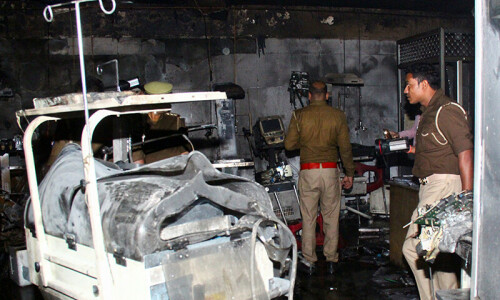POLITICIANS, generals and diplomats in India and Pakistan all realise the blessings of peace once they are no longer in office.
And so it has proved in the recent spate of public discussions in Karachi with the arrival of an Indian delegation of the great and the good. The occasion was the launch of Khurshid Kasuri’s book Neither a Hawk nor a Dove. In another event, our affable ex-foreign minister voiced his confidence in the common sense of people on both sides of the border.
I wish I could share his optimism. After years of being a dove on the question of our relations with India, I fear I have finally succumbed to pessimism about the process — if, indeed, there is a process to speak of.
The Indo-Pak peace lobby is becoming feebler.
For a long time now, I have written about the need to overcome past grievances, and join the rest of the human race by replacing bombs and insults with trade and travel between the two countries. But clearly, paranoia and old grudges continue to dominate the discourse.
The sad thing is that with time, the peace lobby is becoming feebler as the younger generation of Indians and Pakistanis has little interest in breaking the deadlock. Peace activists on both sides who make the annual yatra across the border are getting greyer, and their slogans are losing their power and passion.
Tariq Fatemi, Nawaz Sharif’s special assistant on foreign affairs, thought that the public in India and Pakistan should put pressure on their respective governments to resolve their differences. The problem is that our prime minister needs no convincing about the benefits of peace, and the Indian PM sees no political advantage in pursuing good relations with his neighbours.
As the mood in India turns nasty, and sportsmen, musicians, and theatre groups from Pakistan are targeted by Hindu extremists, it is hard to retain any sense of optimism. Although liberal and secular Indians are appalled and embarrassed by the recent examples of chauvinism, they are vastly outnumbered by rabid nationalists who are rapidly becoming the face of India.
For a long time, I blamed our military establishment and our civilian hawks for the impasse, and argued that as there was no possibility of a military or diplomatic solution of the Kashmir problem, we needed to accept the status quo and move on. But India is no longer interested in conceding even this, insisting that Kashmir is a part of India, and cannot even be discussed.
Looking at what’s happening in the region, and the obvious need to approach the terrorist menace collectively, India’s refusal to recognise the changes in Pakistan is self-defeating. Granted New Delhi has many excuses — Kargil and Mumbai among them — but to harp on them endlessly serves nobody except the jingoist lobby in India.
For its part, Pakistan’s foot-dragging over the trial of the alleged backers of the Mumbai terror attack is incomprehensible and inexcusable. But if blame for this lack of progress is to be apportioned — as it should — then on current form, I hold India more responsible.
As the far more powerful state, it ought to have the self-confidence to reach out. Instead, it uses every excuse to refuse meaningful talks. Point-scoring may appeal to the nationalists of Shiv Sena and the BJP, but it does not serve the cause of peace.
There was a time when the Pakistani military establishment needed confrontation with India to justify our large defence expenditure. No longer. Now, the war against the jihadis has enough public support to secure backing for the resources allocated to the army.
In fact, our generals would be glad of a decrease in tension on our eastern border. What they are getting instead is an increase of bellicose rhetoric from India, as well as mounting cross-border shelling across the Line of Control and the Working Boundary.
These factors, as well as a sharp rise in the conventional military imbalance, have contributed to Pakistan’s new doctrine of introducing short-range, low-yield nuclear-tipped battlefield weapons. This deeply worrying development lowers the nuclear threshold on the subcontinent, but has attracted little public concern or debate.
Sudheendra Kulkarni, the organiser of Mr Kasuri’s book launch in Mumbai, and the victim of a Shiv Sena attack involving black ink being poured over him, appeared recently on a local TV channel during his visit to Karachi. He made the point that Shiv Sena does not represent India. While this is certainly true, the immunity the reactionary organisation seems to enjoy indicates a close nexus with the ruling BJP.
Indeed, the steady rise of a muscular form of Hinduism in India mirrors the grip religious extremism has acquired in Pakistan. True, supporters of Hindutva have not attained the levels of violence our jihadis have displayed for years, but on the present trajectory, it is only a matter of time. If nothing else, India can learn from our lesson of allowing extremism to rise unchecked.
Meanwhile, the prospects for peace in South Asia remain bleak.
Published in Dawn, November 7th, 2015
On a mobile phone? Get the Dawn Mobile App: Apple Store | Google Play







































